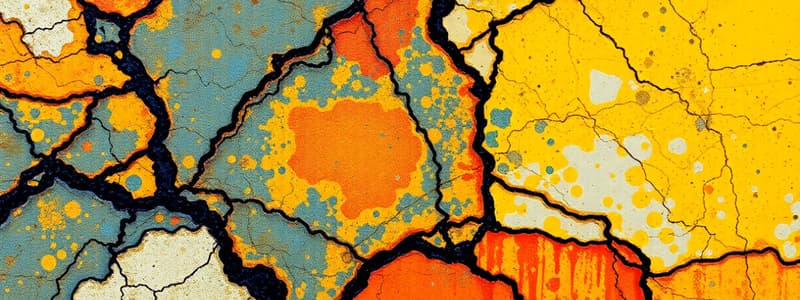Podcast
Questions and Answers
What are exogenic processes?
What are exogenic processes?
Processes that take place at or near the Earth's surface, making the surface wear away.
Which of the following is an example of mechanical weathering?
Which of the following is an example of mechanical weathering?
- Chemical reactions
- Dissolving rock
- Freeze thaw action (correct)
- Erosion by water
What happens during chemical weathering?
What happens during chemical weathering?
Rocks dissolve and form new substances.
Mechanical weathering is the breaking down of larger rock into smaller rocks without any ______ change.
Mechanical weathering is the breaking down of larger rock into smaller rocks without any ______ change.
Chemical weathering causes rocks to remain unchanged.
Chemical weathering causes rocks to remain unchanged.
What type of weathering involves the disintegration of rocks due to the actions of plants or animals?
What type of weathering involves the disintegration of rocks due to the actions of plants or animals?
Frost weathering occurs due to the continuous heating of rocks.
Frost weathering occurs due to the continuous heating of rocks.
Which phenomenon is caused by successive heating and cooling of rocks?
Which phenomenon is caused by successive heating and cooling of rocks?
What is mechanical weathering also called?
What is mechanical weathering also called?
The process of stripping the outer layer of rocks due to intense heating is called ______.
The process of stripping the outer layer of rocks due to intense heating is called ______.
What is the main effect of oxidation in rocks that contain iron?
What is the main effect of oxidation in rocks that contain iron?
What chemical process is known for forming various types of carbonates in rocks?
What chemical process is known for forming various types of carbonates in rocks?
Flashcards are hidden until you start studying
Study Notes
Exogenic Processes
- Exogenic processes occur at or near the Earth’s surface and are responsible for the degradation and alteration of geological features.
- These processes lead to the wearing away of the Earth's surface materials over time.
Types of Weathering
-
Mechanical Weathering
- Involves the physical breakdown of larger rocks into smaller fragments without altering their chemical composition.
- An example is freeze-thaw action, where water infiltrates cracks in rocks, freezes, expands, and eventually causes the rock to fracture.
-
Chemical Weathering
- This process involves the chemical alteration of rocks, leading to their dissolution and the formation of new substances.
- It results in changes to the mineral composition of the rocks, affecting their stability and structure.
Weathering Types
- Biological weathering involves the disintegration of rocks through the actions of living organisms, particularly plants and animals.
- Physical weathering (also known as mechanical weathering) breaks rocks into smaller pieces without altering their chemical composition.
Block Disintegration
- Results from repeated heating and cooling, causing rocks to expand and contract.
- Significant in hot deserts where temperature fluctuations between day and night are pronounced.
Exfoliation Process
- Occurs due to intense heating, causing outer layers of rocks to strip away.
- Involves the peeling of concentric shells from the main rock mass due to successive expansion and contraction.
Frost Weathering
- Occurs when water trapped in rock joints freezes and thaws alternately.
- Causes the rocks to fracture into smaller particles as water expands upon freezing.
Chemical Weathering Mechanisms
- Involves the weakening or breakdown of rocks and the creation of new substances due to chemical reactions.
Oxidation
- Oxygen interacts with minerals in rocks, altering their composition.
- Most significant effects observed in ferrous minerals, especially those containing iron, leading to rust formation.
Carbonation
- Involves the formation of carbonates within rocks which causes an increase in size and the leaching of lime that binds particles.
- Carbon dioxide combines with water to create carbonic acid, enhancing weathering effects.
Hydration Process
- Water integrates or reacts with substances in rocks, resulting in a change in physical shape or structure.
Studying That Suits You
Use AI to generate personalized quizzes and flashcards to suit your learning preferences.




